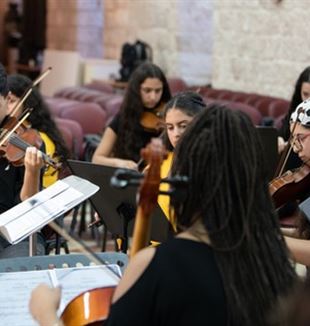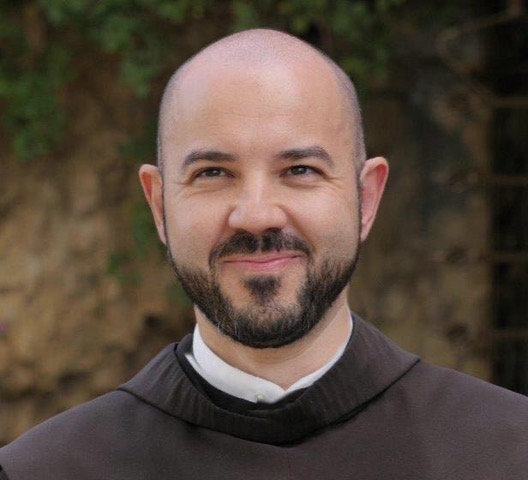
Holy Land: To the tune of the Magnificat
An internationally renowned music school in the heart of the Old City of Jerusalem. A unique experience of welcoming, of dialogue, which speaks of a possible peace. Its director, Fr. Alberto Joan Pari, speaks.The Magnificat Institute in Jerusalem is a unique school of its kind: founded in the heart of the Old City of Jerusalem in 1995, its rooms were obtained and adapted in the basement of the Convent of St Saviour, where meat was once prepared for the various convents of the city, and where today it brings hundreds of young people closer to music. It is there that we met Brother Alberto Joan Pari, the current director of the school that now has around 200 students and 21 teachers: "The school offers high-level teaching that allows access to European university diplomas and recognition, through an agreement with the 'Arrigo Pedrollo' Conservatory of Vicenza. Students can study piano, violin, viola, cello, organ, singing, classical guitar, flute, percussion, choral music, solfeggio, harmony and history of music; in fact, it is the foreign branch of the Italian conservatory in Vicenza. We also have the task of animating the liturgical services celebrated in the Holy Places (such as the Basilica of the Holy Sepulchre or the Basilica of the Nativity in Bethlehem). Above all, however, here we learn that it is possible to live together, in peace, united by beauty and not divided by different affiliations.”
The Magnificat, recounts Pari, was born "from the desire of Fr. Armando Pierucci, an Italian Franciscan musician who, having arrived in Jerusalem to serve as organist for the liturgies of the Holy Sepulchre, realised that there was no music, particularly in the Old City. Children, Palestinian Christians, began to learn to sing around a piano, guided by two Christian women and by Brother Armando. That was the beginning of everything.” It is a story that continues to this day despite the ongoing war. Brother Alberto is not discouraged. "It is not an easy time, but music succeeds in creating unity because it breaks down differences, language, beliefs, different cultures. In the choir and orchestras, or in the ensemble music groups, the young people come from different cultural and linguistic backgrounds, they are Christians, Muslims and Jews. The language they have in common is that of music and harmony. We certainly have had some difficult days: after October 7, some Muslim pupils did not want to go back to play in the string group, which is led by a Jewish teacher of Ukrainian origin. At the first meeting he was very brave and began the lesson by saying that we are not together to bring the hatred and anger we feel into the classroom, but we are together to create something beautiful that can be given to everyone. And thus show that living together in this country is possible and worthwhile.”
With this in mind, the lessons continued despite the tense climate in Israel. I asked Brother Alberto how it is possible to continue living and playing together while the war rages on. He replied that the friendship that binds these young musicians comes from afar. And he recounted two stories: “Mohamed is Muslim and lives in Ramallah. At the age of 11, he discovered he had a natural talent for the piano, so his Russian-born mother decided to enrol him with us because she had heard about the high level of music, in particular the skill of a Russian teacher. During the lesson, Mohammed met Emma, a Ukrainian girl who was expelled as a child from the conservatory where she was studying because she was Jewish and who was forced to emigrate with her family, first to Russia and then here, in order to continue her piano studies. Mohammed graduated from the Magnificat last year, coming to Jerusalem two or three days a week for lessons, sometimes waiting two hours at the checkpoint to leave his home in Palestine and reach the institute in Israel. And to play together with Emma. Then there is Musa, a young Muslim from Bethlehem who plays the clarinet. His teacher is a Jew from Jerusalem. Musa was never allowed, unlike Mohammed, to leave Palestine and physically come to the Magnificat for his lessons. So we found a Lutheran church that is on the border, in that no man's land that is not Israel but officially not Palestine either, an occupied territory but not restricted by the wall. The Protestant pastor gave us permission to do the clarinet lessons in his church during the week, so Musa and Yehiel met for about two years to complete the course. In February, Musa will graduate in Vicenza. When we talk about a possible coexistence, we talk about stories like theirs.”
Read also - Holy Land. The law of forgiveness
Before saying goodbye I asked Brother Alberto to tell me something about himself, about how he ended up in Jerusalem, how what is happening now challenges his faith, what allows him to remain steadfast in the face of so much suffering. Calmly and with a smile that – I realise now – always brightens his face, he replied: “I arrived in the Holy Land seventeen years ago. I had never thought of this land as a place to live my faith, but the Lord made this the place where I could fulfil my vocation. What is happening is not new for this blessed and tormented country, history repeats itself, although I never imagined I would experience a war during my lifetime. Living in Jerusalem made the question about my vocation and mission come to the surface strongly: if the situation degenerated would I stay? The unanimous answer of my Franciscan community, which is also my own, is yes. The Lord became incarnate in this land, and gave us redemption, and the places that bear witness to our faith need to be cared for. Above all, our mission is to guard the living stones, the Christians of the Holy Land. Since October 7, I have created a group of friends to whom I send a daily message to tell them about what we are experiencing and the various projects we are trying to carry out at the Magnificat. So many people have offered to help us and among them are the teachers and students of the International Music Friendship. They are one of the signs of a possible friendship that continues to grow and expand far beyond our expectations, just as happened to the first Christians: the beauty of the encounter with Jesus spread by word of mouth, by fascination, within a web of relationships that has come down to us.”